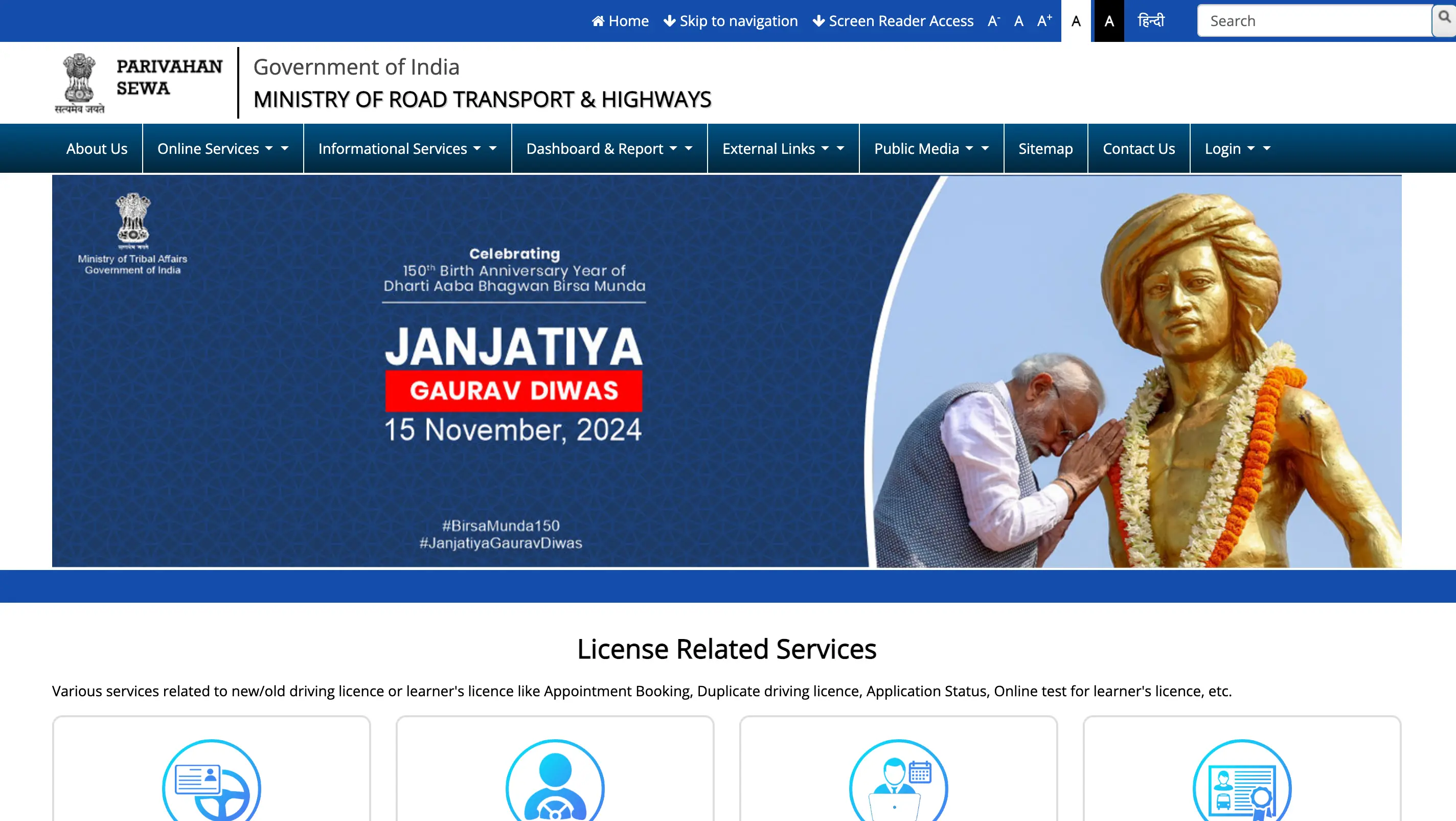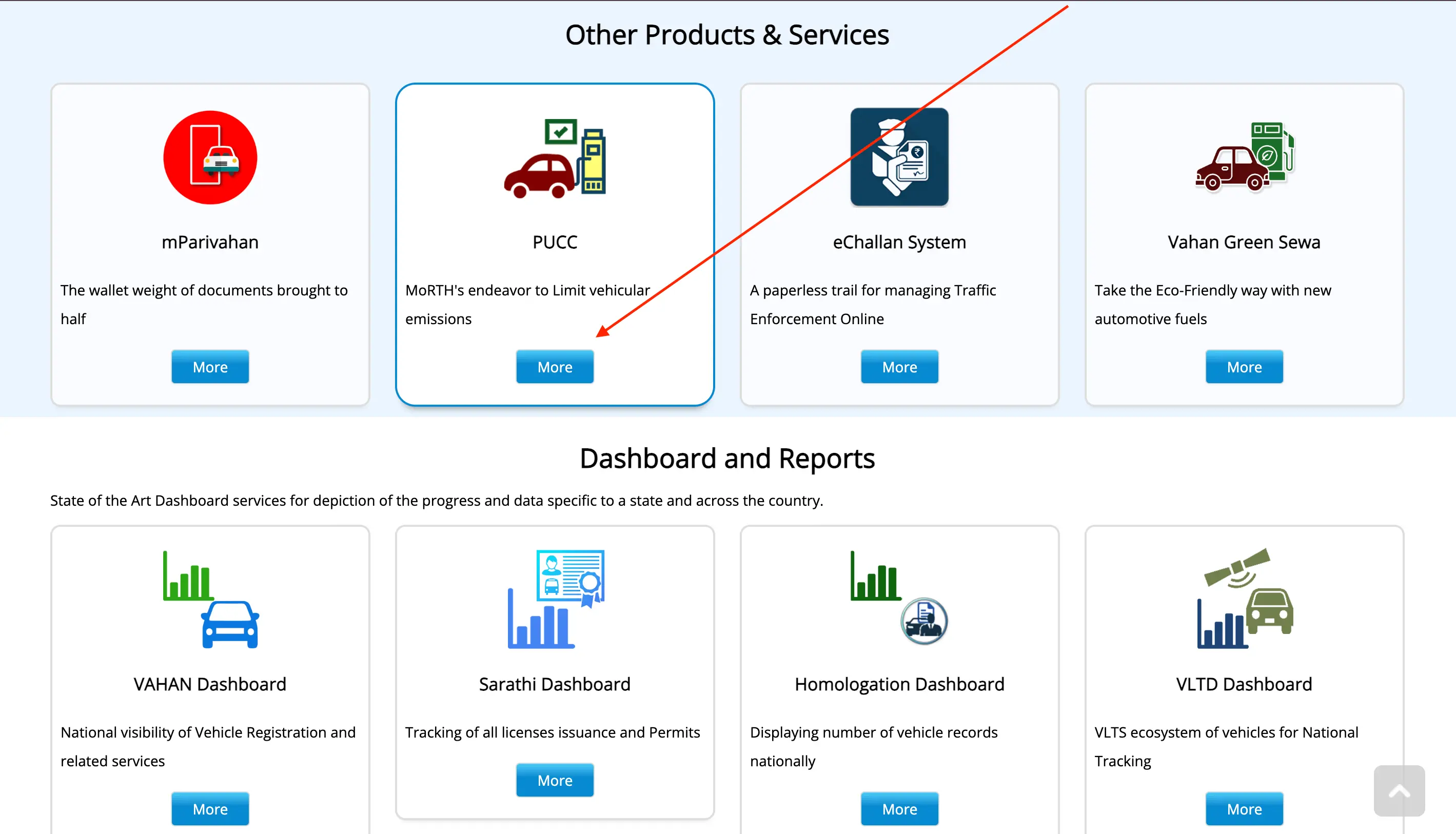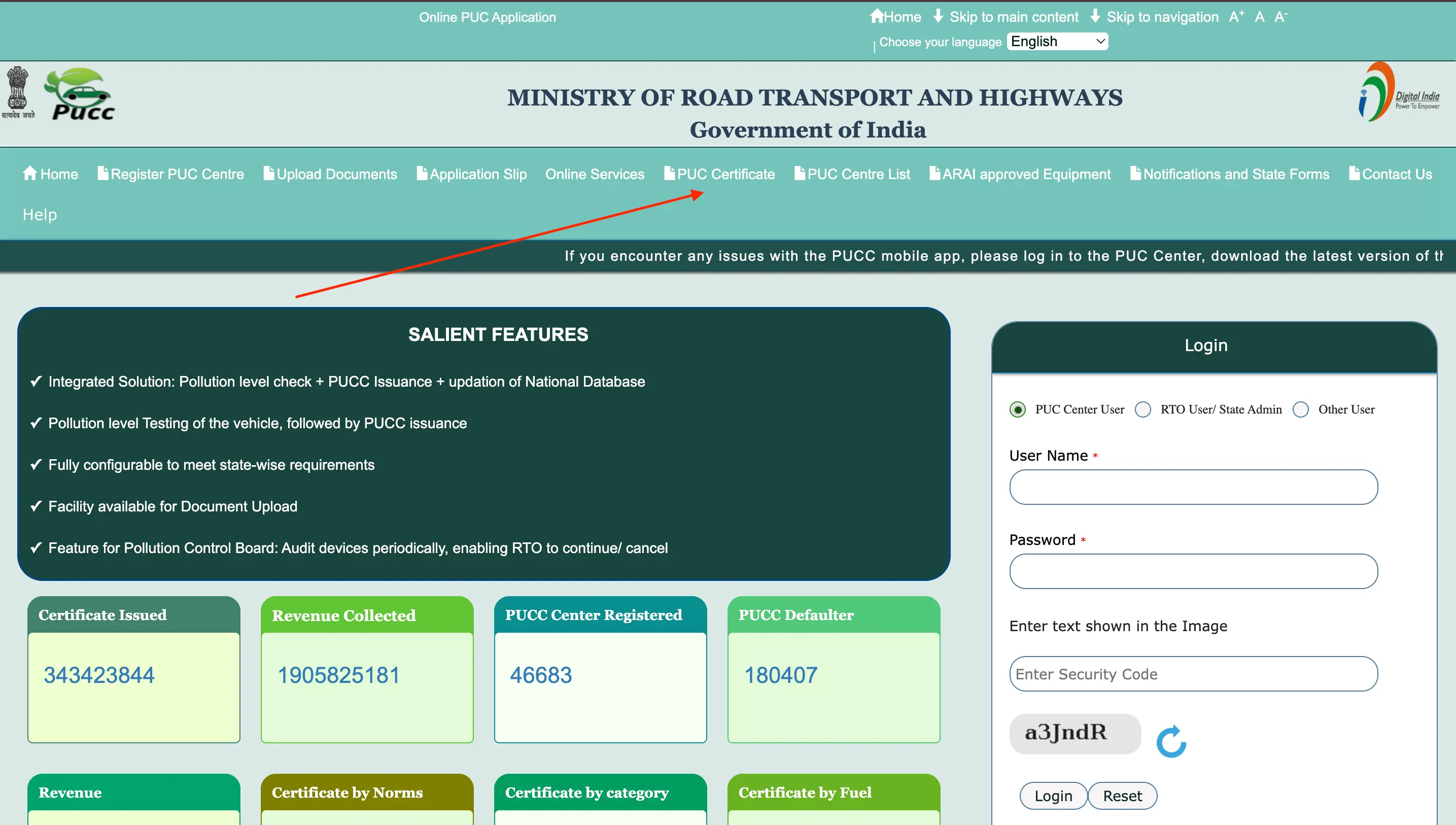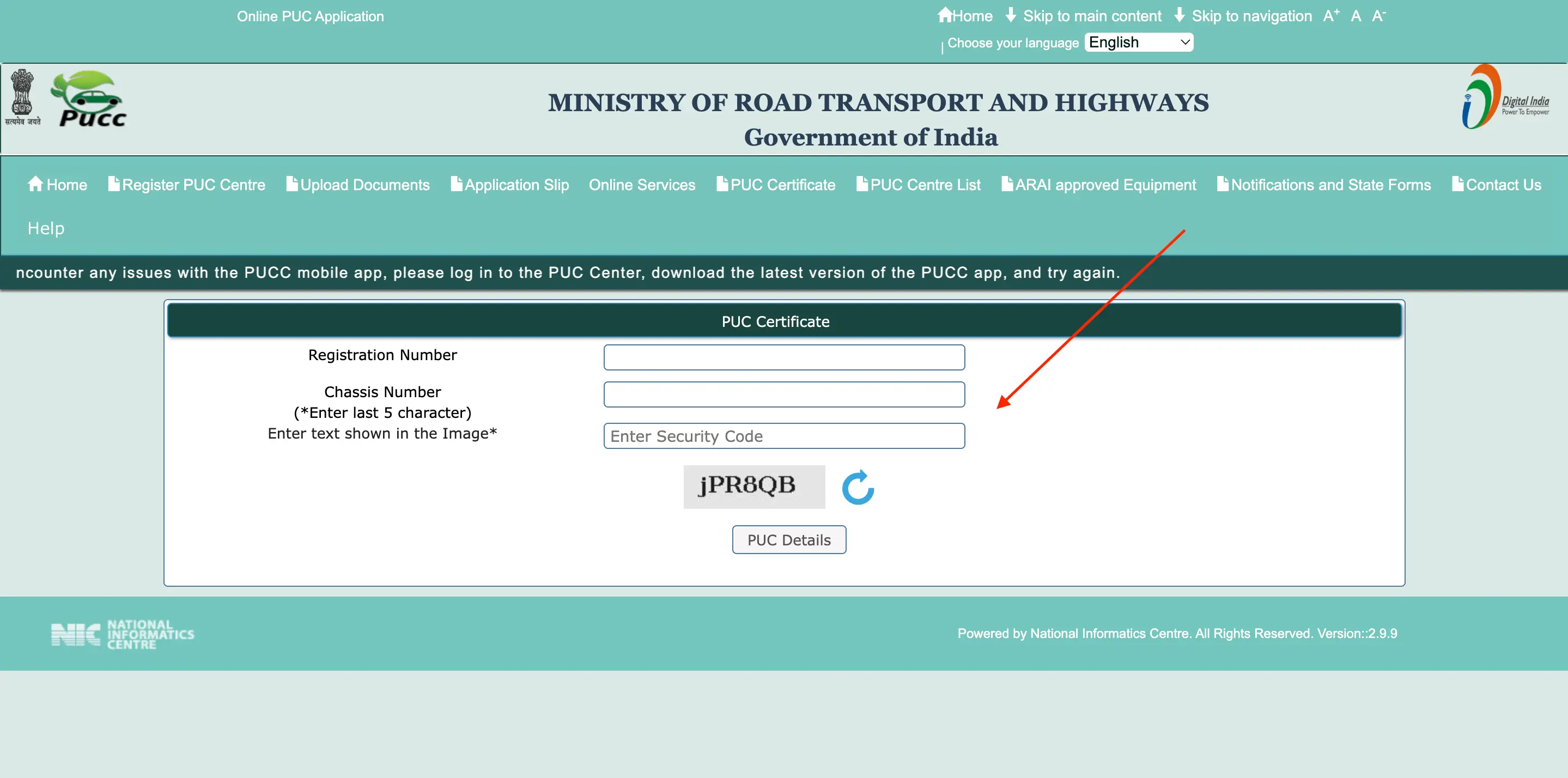The Pollution Under Control or PUC Certificate is an official document that shows your vehicle follows pollution standards set by the government. It checks how much smoke or harmful gases your vehicle releases into the air.
This test is typically performed at authorized testing centers. Having a valid PUC certificate is required by law and ensures your active participation towards reduced air pollution. Also, note that any individual who drives without having a PUC Certificate will face fines or penalties.
Read on to understand the key aspects of PUC and add value as a responsible citizen committed to protecting the environment.
The Pollution Under Control Certificate confirms that your vehicle meets government-approved emission standards, helping reduce air pollution. It also ensures that you follow the rules as per the Motor Vehicles Act, which helps avoid penalties.
Table of Contents:
- ⇾ PUC Certificate Requirement and Its Importance
- ⇾ Details Available in the PUC Certificate
- ⇾ PUC Certificate Validity Period
- ⇾ Cost of PUC Certificate
- ⇾ Apply for PUC Certificate
- ⇾ Steps to Download Your PUC Certificate Online & Offline
- ⇾ Steps to Check Validity of PUC Certificate Offline
- ⇾ Renew PUC Certificate for Vehicles
- ⇾ Benefits of Pollution Under Control Certificate
- ⇾ Documents Required for a PUC Certificate
- ⇾ Is the PUC Certificate Mandatory in India
- ⇾ Vehicles That Need a PUC Certificate
- ⇾ Penalties for Not Having a Valid Pollution Certificate
- ⇾ Frequently Asked Questions
Importance of PUC Certificate
A PUC Certificate is mandatory for all motor vehicles in India after one year from the date of first registration and must be renewed every six months.
This certificate confirms that the vehicle’s emissions are within the limits set by the Central Pollution Control Board (CPCB) and helps in reducing harmful air pollution.
Here’s why it is important:
- Helps keep the environment clean by ensuring vehicles do not emit harmful gases.
- Reduces vehicle emissions and improves overall air quality which contributes to public health.
- Driving without a valid PUC certificate can lead to fines and penalties.
- Regular checks help identify engine or emission issues early.
- Some states may require a valid PUC for vehicle insurance renewal.
Be up to date with your credit score. Check it out for free now!
Details Available in the PUC Certificate
The details given in the PUC Certificate are as follows:
- Serial Number.
- Registration Number.
- Date of PUC Test.
- Certificate Validity.
- Reading of the PUC Test.
PUC Certificate Validity Period
In India, the validity period of a Pollution Under Control (PUC) Certificate varies based on the vehicle's age and emission standards:
| Vehicle Type/Emission Standard | Validity |
|---|---|
| New vehicles | 1 year from the date of registration |
| BS-IV and BS-VI vehicles** | 12 months |
| Old vehicles | 6 months |
Vehicle owners must renew their PUC certificates before expiration to ensure that they follow the emission norms and prevent any legal penalties.
The PUC Certificates of new vehicles must be renewed after 1 year. Since the PUC validity period for old vehicles is 6 months, these vehicles must undergo emission level tests every 6 months to have a PUC Certificate.
Cost of PUC Certificate
Generally, the cost of obtaining a Pollution Under Control Certificate is ₹60-₹100. However, there may be variations based on the fuel and vehicle. Also, these charges can differ across states and are subject to revisions.
Do you need an instant loan?
Apply for PUC Certificate
You cannot apply for a PUC certificate online, you can do it offline only. Check the steps to apply for a Pollution Under Control certificate from below:
- Visit an authorised PUC center – These are usually located at petrol pumps or RTO-approved locations.
- Get your vehicle tested – The technician will check your vehicle’s emission levels using a pollution testing device.
- Receive your certificate – If your vehicle passes, you'll get a printed PUC certificate instantly with validity details.
You can locate the RTO-approved emission testing centers near you from the Pariwahan portal. Here’s how you can do it:
- Visit the Parivahan PUC portal
- Enter your vehicle registration number and other details
- Locate nearby testing centers or check existing certificate status
Steps to Get PUC Certificate Online & Offline
In the case of the PUC online application process, you can follow the same steps to download your PUC Certificate online.
Steps to Register for PUC Online
- Visit the Parivahan website - parivahan.gov.in.
- Scroll down and under ‘Other Products and Services’, click on the PUCC button.
- Click on the ‘PUC Certificate’ section on the homepage.
- On the next page, enter your Registration Number and the last 5 digits of your Chassis Number.
- Enter your Security Code as per the captcha provided.
- Click on ‘PUC Details.’
- Download or print the PUC Certificate as needed.




You can follow these same steps to check the validity of your PUC Certificate.
Not sure of your credit score? Check it out for free now!
Steps to Get PUC Certificate Offline
- Visit an authorized PUC testing center which is usually available at fuel stations or Regional Transport Offices (RTOs).
- A technician will conduct an emission test by inserting a device into your vehicle's exhaust pipe to measure emission levels.
- If your vehicle meets the required emission standards, a new PUC certificate is issued immediately.
- Pay the necessary fees to access the PUC Certificate.
Renew PUC Certificate for Vehicles
The renewal process for a PUC Certificate in India involves a mandatory emission test to ensure your vehicle's emissions are within the limits.
There is no online procedure to renew the PUC Certificate for the vehicle. Hence, you are required to follow the same steps as mentioned in the offline application for the PUC Certificate to renew your certificate. That is, the vehicle must undergo an emission test at your nearest emission testing center.
Benefits of a Pollution Under Control Certificate
Aside from being a legal requirement, there are several benefits to having a PUC Certificate:
- Enhances the resale value of your vehicle, as it shows that you follow the emission norms and well-maintained vehicle.
- Supports the renewal of vehicle insurance policies, ensuring that your vehicle meets emission standards before policy continuation.
- Frequent emission checks can indicate the health of your vehicle's engine and emission system, allowing for timely maintenance and repairs.
Documents Required for a PUC Certificate
To obtain a PUC Certificate in India, you typically need to provide the following document at an authorized emission testing center:
- Vehicle Registration Certificate (RC): It provides essential details about your vehicle, such as its registration number, owner information, and vehicle specifications.
Although this is the primary document required, you can also carry additional vehicle-related documents such as driving license, insurance papers, etc for verification.
This is because, sometimes testing centers may ask for these and therefore it is advised to keep them in hand if the need ever arises.
Do you need an instant loan?
Is PUC Certificate Mandatory in India
As per the Central Motor Vehicle Rules, 1989, it is mandatory for all vehicle owners in India to have a PUC Certificate. The PUC Certificate ensures that vehicles comply with emission standards and do not harm the environment.
Regular PUC tests help monitor and control vehicular emissions, thereby contributing to reduced air pollution and a healthier environment. Furthermore, these tests help identify the vehicle's engine performance and emission system which helps in timely repairs.
All types of motor vehicles in India that run on fuel—petrol, diesel, CNG, or LPG—are required to have a valid PUC Certificate.
Vehicles That Need a PUC Certificate
The emission standards, particularly for Carbon Monoxide (CO) and Hydrocarbons (HC), vary based on the type of vehicle, fuel, and manufacturing date.
Have a look at each of them:
- Old Vehicles:
- Diesel Vehicles:
- New Vehicles:
The table below shows an overview of the PUC permissible emission limits for old vehicles:
| Types of Vehicles | Carbon Monoxide (%) | Hydrocarbon (in PPM) |
|---|---|---|
| BS3 4 wheelers (Petrol) | 0.5 | 750 |
| BS2 4 wheelers (Petrol) | 3 | 1500 |
| (2/4-stroke) 2 & 3 wheelers manufactured on or before March 31, 2000 |
4.5 | 9000 |
| (2 stroke) 2 & 3 wheelers manufactured after March 31, 2000 |
3.5 | 6000 |
| (4 stroke) 2 & 3 wheelers manufactured after March 31, 2000 |
3.5 | 4500 |
For diesel vehicles, emissions are measured based on the Light Absorption Coefficient rather than CO and HC percentages. The permissible limits are:
| Pre-BS IV norms | Up to 2.45 per meter |
| BS-IV norms | Up to 1.62 per meter |
For new vehicles, the PUC permissible emission limits are as follows:
| Types of Vehicles | Carbon Monoxide (%) | Hydrocarbon (in PPM) |
|---|---|---|
| BS6 and BS4 4 wheelers (CNG/LPG) |
0.3 | 200 |
| BS6 and BS4 4 wheelers (Petrol) |
0.3 | 200 |
| BS6 2 & 3 wheelers (CNG/LPG) |
0.5 | 500 |
| BS6 2 & 3 wheelers (Petrol) |
0.5 | 500 |
Penalties for Not Having a Valid Pollution Certificate
Driving without a valid Pollution Under Control Certificate in India is a legal offense under the Motor Vehicles Act. The penalties are as follows:
| First Offense | ₹1000 |
| Repeated Offense | ₹2000 for each |
Are you looking for a personal loan?
- SBI Personal Loan
- HDFC Personal Loan
- Axis Personal Loan
- Bank of Baroda Personal Loan
- PNB Personal Loan
- Canara Bank Personal Loan
- ICICI Bank Personal Loan
- IDFC First Bank Personal Loan
- Indian Overseas Bank Personal Loan
- IDBI Bank Personal Loan
- Citi Bank Personal Loan
- Bank of India Personal Loan
- Federal Bank Personal Loan
- UCO Bank Personal Loan
- Union Bank of India Personal Loan
- Yes Bank Personal Loan
- Central Bank of India Personal Loan
- Induslnd Bank Ltd Personal Loan
- Indian Bank Personal Loan
- RBL Bank Personal Loan
- Bandhan Bank Personal Loan
- J&K Bank Personal Loan
- Karnataka Bank Personal Loan
- Karur Vysya Bank Personal Loan
- South Indian Bank Personal Loan
- HSBC Bank Personal Loan
- Bank of Maharashtra Personal Loan
- Punjab and Sind Bank Personal Loan
- Dhanlakshmi Bank Loan
- Ujjivan Small Finance Bank Personal Loan
- SBI Personal Loan for Low Salary
- SBI Personal Loan ₹15000 Salary
- SBI Personal Loan ₹25000 Salary
- Paysense Personal Loan
- Fibe Personal Loan
- Incred Personal Loan
- Mpokket Personal Loan
- NIRA Personal Loan
- Prefr Personal Loan
- Cashe Personal Loan
- Loanbaba Personal Loan
- Pocketly Loan
- MoneyTap Personal Loan
- Zype Personal Loan
- TATA Capital Personal Loan
- Muthoot Finance Personal Loan
- Bajaj Finance Personal Loan
- Dhani Personal Loan
- L&T Finance Personal Loan
- Upwards Personal Loan
- LoanTap Personal Loan
- Phocket Personal Loan
- Faircent Personal Loan
- HDB Personal Loan
- Finnable Loan
- Aditya Birla Personal Loan
- IndiaLends Personal Loan
- IIFL Personal Loan
- Sriram Finance Personal Loan
- Stashfin Loan
- Reliance Personal Loan
- MyMoneyMantra Personal Loan
- Credy Loan
- Piramal Finance Personal Loan
- Poonawala Fincorp Personal Loan
- Flipkart Personal Loan
- Google Pay Loan
- Paytm Personal Loan
- Phonepe Loan
- Mobikwik Loan
- NBFC Personal Loan
- Rapid Rupee Personal Loan
- Rupeek Personal Loan
- Moneyview Personal Loan
- Personal Loan For Salaried
- Personal Loan for Self Employed
- Personal Loan for Startups
- Personal Loan for Government Employees
- Personal Loan for Professionals
- Personal Loan For Women
- Personal Loan For Lawyers
- Personal Loan for Doctors
- Personal Loan for Students
- Personal Loan for Teachers
- Loans for Chartered Accountants
- Loan for Housewives
- Loans for Widows
- Loans for Taxi Drivers
- Loans for Graduates
- Personal Loan for Low Cibil Score
- Types of Personal Loan
- Emergency Loan
- Insta Loan
- Top Up Loan
- Long Term Personal Loans
- Short Term Personal Loans
- Personal Loan on Aadhaar Card
- Personal Loan Hyderabad
- Personal Loan in Mumbai
- Personal Loan in Bangalore
- Personal Loan in Erode
- Personal Loan in Chennai
- Personal Loan in Delhi
- Personal Loan in Kolkata
- Personal Loan in Pune
- Personal Loan in Lucknow
- Personal Loan in Ahmedabad
- Personal Loan in Chandigarh
- Personal Loan in Navi Mumbai
- Personal Loan in Bhopal
- Personal Loan in Jaipur
- Personal Loan in Trivandrum
- Personal Loan in Noida
- Personal Loan in Gurgaon
- Personal Loan in Vadodara
- Personal Loan in Rajkot
- Personal Loan in Agra
- Personal Loan in Mysore
- Personal Loan in Dehradun
- Personal Loan in Patna
- Personal Loan in Ludhiana
- Personal Loan in Ghaziabad
- Personal Loan in Goa
- Personal Loan in Kochi
- Personal Loan in Ernakulam
- Personal Loan in Calicut
- Personal Loan in Udaipur
- Personal Loan in Kanpur
- Personal Loan in Coimbatore
- Personal Loan in Guwahati
- Personal Loan in Varanasi
- Personal Loan in Bhubaneswar
- Personal Loan in Pondicherry
- Personal Loan in Mangalore
- Personal Loan in Vellore
- Personal Loan in Surat
- Personal Loan in Thrissur
- Personal Loan in Raipur
- Personal Loan in Trichy
- Personal Loan in Visakhapatnam
- Personal Loan in Nagpur
- Personal Loan in Indore
- Personal Loan in Nashik
- Personal Loan in Vijayawada
- Personal Loan in Amritsar
- Personal Loan in Thane
- Personal Loan in Jamshedpur
- ₹50000 Personal Loan
- ₹1 Lakh Personal Loan
- ₹3 Lakh Personal Loan
- ₹5 Lakh Personal Loan
- ₹10 Lakh Personal Loan
- 15 Lakhs Personal Loan
- 20 Lakhs Personal loan
- 30 Lakh Personal Loan
- 50 Lakhs Personal Loan
- ₹4000 Personal Loan
- ₹5000 Personal Loan
- ₹10000 Personal Loan
- ₹20000 Personal Loan
- ₹25000 Personal Loan
- ₹30000 Personal Loan
- ₹40000 Personal Loan
- SBI Personal Loan Customer Care Number
- HDFC Bank Personal Loan Customer Care Number
- ICICI Bank Personal Loan Customer Care Number
- Bank of Baroda Personal Loan Customer Care Number
- PNB Personal Loan Customer Care Number
- Axis Bank Personal Loan Customer Care Number
- Canara Bank Personal Loan Customer Care Number
- IndusInd Bank Personal Loan Customer Care Number
- IDFC Bank Personal Loan Customer Care Number
- Indian Bank Personal Loan Customer Care Number
- Union Bank Personal Loan Customer Care Number
- Yes Bank Personal Loan Customer Care Number
- Indian Overseas Bank Personal Loan Customer Care Number
- IDBI Bank Personal Loan Customer Care Number
- Bank of India Personal Loan Customer Care Number
- Central Bank of India Personal Loan Customer Care Number
- Federal Bank Personal Loan Customer Care Number
- Standard Chartered Personal Loan Customer Care Number
- UCO Bank Personal Loan Customer Care Number
- Bandhan Bank Personal Loan Customer Care Number
- RBL Bank Personal Loan Customer Care Number
- Small Business Loan
- Business Loans for Women
- Startup Business Loans
- Working Capital Loan
- Unsecured Business Loan
- Cash Credit Loan
- Commercial Loans
- Commercial Vehicle Loans
- Equipment Loans
- Medical Equipment Loan
- Construction Equipment Loan
- Equipment Leasing Loan
- Corporate Loan
- Collateral Free Loans
- Business Loan for Startup
- Types of Business Loan
- Loans for Restaurants
- Loans for Private Schools
- Loans for Defence Personnel
- Loans for Construction
- Loans for Commercial Shop Purchases
- Loans for Chartered Accountants
- Loans for Buying Land
- Loan for Beauty Parlour
- Loan for Warehouse
- Cold Storage Loan
- Dairy Farm Loan
- E-Commerce Loans
- Animal Husbandry Loan
- Loan for Medical Shop
- Loan for Dental Clinic
- SBI business loan
- HDFC Bank business loan
- Axis Bank business loan
- Bank of Baroda business loan
- PNB business loan
- Canara Bank business loan
- ICICI Bank business loan
- IDFC Bank business loan
- IOB business loan
- IDBI Bank business loan
- Bank of India business loan
- Federal Bank business loan
- UCO Bank business loan
- Union Bank business loan
- Yes Bank business loan
- Central Bank of India business loan
- IndusInd business loan
- Indian Bank business loan
- RBL Bank business loan
- Bandhan Bank business loan
- mCapital Business Loan
- Ambit Finvest Business Loan
- InCred Business Loan
- TATA Capital Business Loan
- Protium Business Loan
- IIFL Business Loan
- Aditya Birla Business Loan
- IndiaLends Business Loan
- InCred Business Loan
- Mahindra Finance Business Loan
- Indifi Business Loan
- NeoGrowth Business Loan
- Bajaj Finserv Business Loan
- HDB Business Loan
- UGRO Business Loan
- Hero FinCorp Business Loan
- Shriram Finance Business Loan
Frequently Asked Questions
A Pollution Under Control (PUC) Certificate is an official document that certifies a vehicle's emissions comply with the prescribed pollution control norms in India.
A PUC Certificate is necessary for vehicles in India to ensure they meet the government’s emission standards, helping to control air pollution.
For new vehicles, the Pollution Under Control (PUC) certificate is valid for one year; thereafter, it must be renewed every six months.
To get a PUC Certificate, a vehicle must meet the safe limits of pollution. And, the government has set a release limit, type of vehicle and the kind of fuel to be used.
To get a PUC Certificate, take your vehicle to an authorized pollution testing center. If your vehicle passes the test, you’ll get the certificate after paying a small fee.
Driving without a valid PUC Certificate in India can result in fines ranging from ₹1,000 to ₹10,000, depending on the vehicle type and state regulations.
No, as a new PUC Certificate online because your vehicle needs to be tested in person. But after the test, you can download or check the certificate online through the Parivahan website.
To obtain a PUC Certificate in India, you typically need to present your vehicle's Registration Certificate (RC) at an authorized emission testing center.
The cost of obtaining a PUC Certificate in India is based on the vehicle type and fuel used. Generally, fees range from ₹60 to ₹100, but these charges can differ depending on the state and specific vehicle specifications.
If your vehicle fails the PUC test, it indicates that its emissions exceed the permissible limits set by authorities. In such cases, the testing center may issue a rejection slip, and you are typically advised to address the underlying issues.
Display of trademarks, trade names, logos, and other subject matters of Intellectual Property displayed on this website belongs to their respective intellectual property owners & is not owned by Bvalue Services Pvt. Ltd. Display of such Intellectual Property and related product information does not imply Bvalue Services Pvt. Ltd company’s partnership with the owner of the Intellectual Property or proprietor of such products.
Please read the Terms & Conditions carefully as deemed & proceed at your own discretion.






 Rated 4.5 on Google Play
Rated 4.5 on Google Play 10M+ App Installs
10M+ App Installs 25M+ Applicants till date & growing
25M+ Applicants till date & growing 150K+ Daily Active Users
150K+ Daily Active Users
